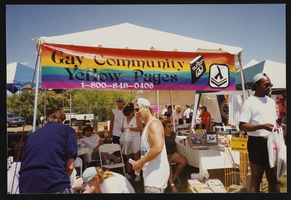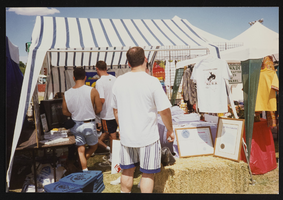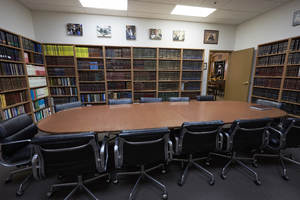Search the Special Collections and Archives Portal
Search Results
Rotary Club of Las Vegas Christmas party, 1986 December 22
Level of Description
Archival Collection
Collection Name: Frank Mitrani Photographs
Box/Folder: Box 20
Archival Component

Gay Community Yellow Pages booth at Gay Pride: photographic print
Date
Archival Collection
Description
Image

Nevada Gay Rodeo Association booth at Gay Pride: photographic print
Date
Archival Collection
Description
Image
Rob Schlegel oral history interviews
Identifier
Abstract
Oral history interviews with Rob Schlegel conducted by Dennis McBride on various dates in March and April of 1998 for the Las Vegas Gay, Lesbian, Bisexual and Transgender Archives Oral History Project. In the interviews, Schlegel recalls his early life in Port Angeles, Washington, his conservative Baptist upbringing, and his early experiences with literature. Schlegel then discusses working with newspaper publications in high school and college, understanding his sexuality during college, his first gay sexual experience, and his first trip to Las Vegas, Nevada. He recalls working with Robert Lloyd "Bob" Brown at the
Archival Collection
Grant, Archie C., University of Nevada, Las Vegas, 1968 August 22
Level of Description
Archival Collection
Collection Name: Frank Mitrani Photographs
Box/Folder: Box 03
Archival Component
Rotary Club of Las Vegas convalescent center, 1976 November 22
Level of Description
Archival Collection
Collection Name: Frank Mitrani Photographs
Box/Folder: Box 38
Archival Component
Cason, Maxine, Las Vegas Board of Realtors, 1974 October 22
Level of Description
Archival Collection
Collection Name: Frank Mitrani Photographs
Box/Folder: Box 11
Archival Component
Vegas PBS Interviews for the African Americans in Las Vegas: a Collaborative Oral History Project
Identifier
Abstract
Oral history interviews with Ruby Amie Pilot, Eva G. Simmons, Melvin Sanders, Jarmilla McMillan-Arnold, Hannah Brown, Sonny Thomas, and Claytee White conducted by Vegas PBS on April 01, 2013, April 02, 2013, April 12, 2013, and November 19, 2013 for the African Americans in Las Vegas: a Collaborative Oral History Project. In these interviews, the participants discuss their early lives and moving to Las Vegas, Nevada. Pilot talks about segregation on the Las Vegas Strip, integration, and the importance of church activities in the African American community. Simmons describes her career as a teacher, the schools on the Westside, and businesses on Jackson Street. Thomas describes the funeral industry and his role as a funeral director. McMillan-Arnold talks about segregated Las Vegas, African American entertainers, and the issue of homelessness on the Westside. Brown remembers growing up on the Westside, segregated schools, and her role as President of the National Coalition of 100 Black Women – Las Vegas chapter. Lastly, Sanders discusses his childhood in Las Vegas, being the son of a preacher, and the redevelopment of the Westside.
Archival Collection
Hardy, Bill, Las Vegas Board of Realtors, 1974 November 22
Level of Description
Archival Collection
Collection Name: Frank Mitrani Photographs
Box/Folder: Box 25
Archival Component

Photograph of library at the Chabad of Las Vegas, Las Vegas (Nev.), September 22, 2016
Date
Archival Collection
Description
The library at the Chabad of Las Vegas at 1261 Arville Street.
Image
